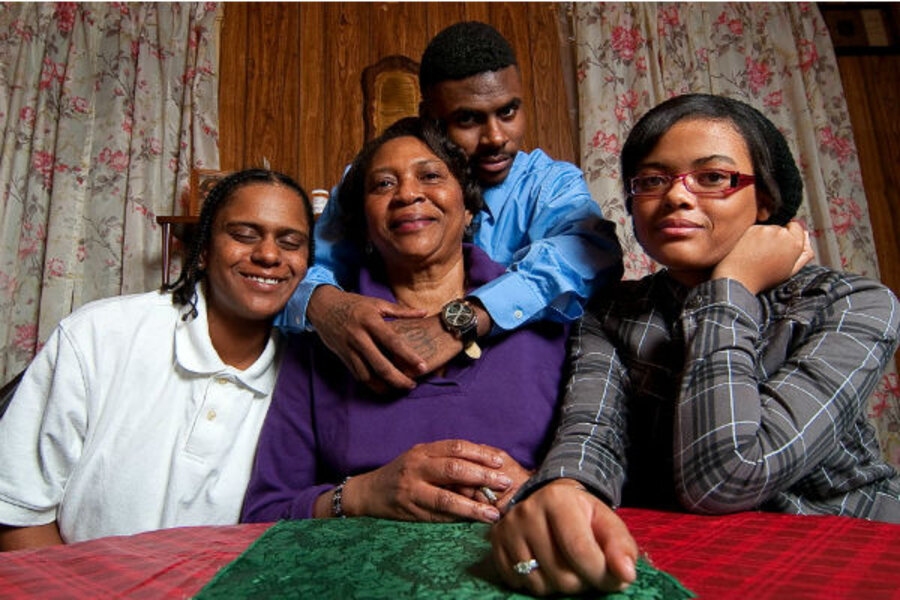Kinship care beats foster care for raising kids – support needed
Loading...
| New York
As more of America's children are raised by relatives other than their parents, state and local governments need to do better in helping these families cope with an array of financial and emotional challenges, a new report concludes.
Compared with the average parent, these extended-family caregivers are more likely to be poor, elderly, less educated, and unemployed, according to the report, "Stepping Up For Kids", being released Wednesday by the Baltimore-based Annie E. Casey Foundation.
Yet despite these hurdles, child-welfare experts say children who can't be raised by their own parents fare better in kinship care than in the regular foster care system.
"We urge state policymakers to make crucial benefits and resources available to kinship families so that their children can thrive," said the Casey Foundation's president, Patrick McCarthy.
According to 2010 census data, about 5.8 million children, or nearly 8 percent of all U.S. children, live with grandparents identified as the head of household. However, many of those children have one or both of their parents in the household, as well as grandparents.
The Casey report focuses on the estimated 2.7 million children being raised in the absence of their parents by grandparents, other relatives or close family friends. The report says this category of children — whose parents might be dead, incarcerated, implicated in child abuse or struggling with addiction — increased 18 percent between 2000 and 2010.
The majority of such living arrangements are established informally, but as of 2010 there also were 104,000 children formally placed in kinship care as part of the state-supervised foster care system.
These children accounted for 26 percent of all children removed from their homes by child welfare agencies and placed in state custody, but practices vary widely. In Florida and Hawaii, kinship care accounts for more than 40 percent of the children in foster care; in Virginia, the figure is only 6 percent.
Through the Fostering Connections Act of 2008 and other programs, federal funds are available to assist children who leave foster care to live under the legal guardianship of relatives. However, states vary in how generously they allocate such funds, and the Casey report said more outreach is needed to ensure that kinship-care families know their options.
"They're trying to navigate this system on their own, and there's not a lot of knowledge about what benefits they're eligible for," said Mark Testa, a professor at the University of North Carolina School of Social Work.
"They're actually doing a heroic job in keeping these kids part of the family, and they deserve our gratitude," he said. "Without them, our foster care system would be overwhelmed."
Donna Butts of the advocacy group Generations United estimated that kinship caregivers save U.S. taxpayers more than $6 billion a year by sparing state and local governments the cost of foster care.
"We shouldn't then just leave them alone," Butts said. "They need information, they need support, they need respite. Both the children and the caregivers need help."
Among the problems encountered by kinship caregivers, according to the Casey report:
—Many of them take on children who were abused or neglected, and are coping with the trauma of family separation.
—They sometimes lack the legal authority for enrolling a child in school or obtaining medical care.
—Though most kinship families are eligible for federal aid through Temporary Assistance for Needy Families, many caregivers are unaware of this option or are reluctant to apply because of perceived stigma.
—Their eligibility for financial aid may be constricted by licensing requirements that were designed for foster parents and aren't always appropriate for kinship families. Such requirements might include foster-parent training programs and regulations pertaining to the square footage and window size in bedrooms.
"Under federal law, unless they can meet the same hypertechnical licensing requirements as strangers, they are not, in fact, entitled to the help that total strangers get," said Richard Wexler of the National Coalition for Child Protection Reform.
Among the agencies viewed as a leader in the field is greater Pittsburgh's Allegheny County Department of Human Services, which makes kinship arrangements for more than half of its children in foster care.
"It's much less traumatic if they can go to someone they know and love, and who knows them, as opposed to going to strangers, no matter how well-intentioned that stranger is," said the department's director, Marc Cherna.
The department policy is to pay kinship caregivers the same rates as other foster parents, and work with them on how to optimize the children's long-term prospects.
According to the Casey report, one in 11 American children lives in kinship care for at least three consecutive months. For black children, the ratio is one in five.
Morrisella Middleton, 62, of Baltimore, raised two of her grandchildren for many years while also working full-time as supervisor of an assisted living facility. The children's mother — Middleton's daughter — had struggled with drug problems and their father died of cancer.
It wasn't easy. Middleton went on disability after incurring congestive heart failure and hypertension, and relied almost entirely on Social Security benefits. Her grandson, Shane, also had chronic health problems related to lead poisoning, she said.
"I did not get the money like people do who are foster parents," Middleton said. "The road has not been easy, but the reward has been so very satisfying. I see the fruits of my labors."
Related: Are you a Helicopter Parent? Take our quiz and find out
Shane, now 19, recently began a job as a retail stock clerk. The granddaughter, LaQuanna, is 24 and works as a pharmacy technician.
Would Middleton advise others to consider kinship care?
"If you love these children and you want them to have a chance, then you don't have a choice," she said. "In somebody else's home, or in a group facility, they're not going to get the chance that you could give them."







